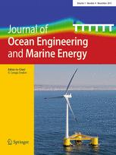
Journal of Ocean Engineering and Marine Energy
Scope & Guideline
Empowering Change through Marine Energy Insights
Introduction
Aims and Scopes
- Marine Renewable Energy Systems:
Research focused on the design, optimization, and performance assessment of marine energy systems, including wave energy converters, tidal turbines, and offshore wind farms. - Hydrodynamics and Fluid Mechanics:
Studies investigating fluid-structure interactions, hydrodynamic forces on marine structures, and modeling of wave and current dynamics in various marine environments. - Environmental Impact and Sustainability:
Exploration of the ecological implications of marine engineering projects and energy systems, emphasizing sustainable practices and technologies that minimize environmental impacts. - Innovative Engineering Solutions:
Development and application of cutting-edge engineering solutions, including advanced materials, computational modeling techniques, and control strategies for marine vehicles and structures. - Coastal and Ocean Engineering:
Research addressing challenges related to coastal infrastructure, including erosion, wave dynamics, and the design of resilient marine structures. - Data Analytics and Monitoring:
Utilization of machine learning, IoT, and data analytics for real-time monitoring, predictive maintenance, and operational optimization of marine energy systems.
Trending and Emerging
- Machine Learning and AI Applications:
There is a growing trend towards integrating machine learning and artificial intelligence in marine engineering, particularly for predictive maintenance and optimization of energy systems. - Hybrid Energy Systems:
Research on hybrid systems that combine wind, wave, and tidal energy sources is on the rise, showcasing innovative approaches to enhance energy efficiency and reliability. - Resilience and Adaptation Strategies:
Studies focusing on the resilience of marine structures to extreme weather events and climate change impacts are increasingly relevant, reflecting global concerns about environmental sustainability. - Smart Sensors and IoT in Marine Monitoring:
The implementation of smart sensors and IoT technologies for real-time monitoring of marine environments is gaining traction, facilitating improved data collection and operational efficiency. - Advanced Computational Modeling Techniques:
There is a notable increase in the use of advanced computational methods, such as CFD and multi-scale modeling, to address complex problems in ocean engineering and energy conversion.
Declining or Waning
- Traditional Marine Energy Technologies:
There is a noticeable decrease in studies focused solely on conventional marine energy technologies, as the field moves towards more innovative and hybrid solutions that integrate multiple energy sources. - Basic Hydrodynamic Studies:
Research that only addresses fundamental hydrodynamic principles without application to specific engineering challenges or technologies is becoming less frequent, as the emphasis shifts towards practical applications and advanced modeling. - Static Structural Analysis:
While structural integrity remains important, the focus on static analysis of marine structures is waning in favor of more dynamic assessments that consider real-time operational conditions and environmental interactions. - Generalized Environmental Assessments:
Studies that broadly assess environmental impacts without specific applications or detailed methodologies are less common, as researchers are now focusing on detailed, project-specific environmental assessments. - Single-Disciplinary Approaches:
Research that does not integrate interdisciplinary perspectives, such as combining engineering with environmental science or socio-economic factors, is becoming less prevalent as collaborative approaches gain importance.
Similar Journals

Physical Oceanography
Advancing Knowledge in Oceanic ProcessesPhysical Oceanography is an esteemed open-access journal dedicated to the exploration and dissemination of research on the dynamic processes that govern the physical aspects of oceans. Published by the Federal State Budget Scientific Institute, Marine Hydrophysical Institute, this journal provides a forum for innovative studies and significant findings in the fields of fluid flow, geophysics, ocean engineering, and water science. With an ISSN of 0928-5105 and an E-ISSN of 1573-160X, Physical Oceanography has been granting open access to its valuable content since 2015, ensuring widespread accessibility and impact in the scientific community. Its rigorous peer-reviewed articles are crucial for researchers, professionals, and students who aim to advance their knowledge and understanding of the intricacies that govern our oceans. With a current impact factor reflecting its solid standing in the Q3 category across multiple disciplines, including oceanography and geophysics, this journal remains a vital resource for advancing oceanographic research and innovation.
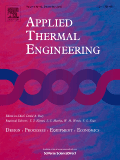
APPLIED THERMAL ENGINEERING
Empowering engineers with cutting-edge thermal insights.Applied Thermal Engineering is a leading international journal dedicated to the field of thermal engineering, published by Pergamon-Elsevier Science Ltd. With an impressive impact factor indicating its significance in the academic community, this journal focuses on innovative research and developments related to energy engineering, fluid flow, and transfer processes, as well as manufacturing and mechanical engineering. Being indexed in top quartiles (Q1) across multiple categories, it ranks exceptionally well on platforms like Scopus, ensuring that contributors reach a wide and relevant audience. The journal supports both open access and subscription options, promoting the dissemination of vital research findings from 1996 to 2024. With its commitment to advancing the discipline and implementing rigorous peer-review processes, Applied Thermal Engineering serves as an essential resource for researchers, industry professionals, and students aiming to stay abreast of the latest advancements and applied methodologies in thermal science.
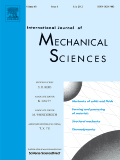
INTERNATIONAL JOURNAL OF MECHANICAL SCIENCES
Exploring New Horizons in Engineering ExcellenceThe INTERNATIONAL JOURNAL OF MECHANICAL SCIENCES, published by PERGAMON-ELSEVIER SCIENCE LTD, stands as a premier platform for groundbreaking research in the field of engineering and applied sciences. With an impressive convergence of scholarly work from 1960 to 2024, the journal maintains its position in the elite Q1 quartile across several categories, including Aerospace Engineering, Mechanics of Materials, and Ocean Engineering, among others. Its esteemed rank within the Scopus database further underscores its vital role in advancing knowledge in Mechanical Engineering and related disciplines, holding ranks in the top percentiles. While it operates on a subscription basis, the journal prioritizes delivering high-quality, peer-reviewed articles that not only inform but also inspire innovation within academia and industry alike. The INTERNATIONAL JOURNAL OF MECHANICAL SCIENCES is an essential resource for researchers, professionals, and students aiming to deepen their understanding and contribute to the dynamic landscape of mechanical sciences.
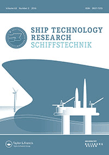
Ship Technology Research
Transforming ship design with cutting-edge research.Ship Technology Research, published by Taylor & Francis Ltd, is a premier journal dedicated to advancing the field of ocean engineering. Established in 1995, this journal provides a critical platform for cutting-edge research, innovative methodologies, and the latest developments in ship technology. With a notable Q2 ranking in the Ocean Engineering category for 2023 and placing in the 70th percentile of Scopus rankings, the journal serves as an essential resource for professionals, researchers, and students aiming to enhance their knowledge and contribute to maritime advancements. The journal not only disseminates high-quality research but also encourages collaboration across disciplines, addressing the real-world challenges faced in ship design, operation, and technology. As a non-open access journal, it continues to uphold rigorous standards, ensuring that published work is both relevant and impactful in fostering innovation in the maritime industry.

IEEE Open Journal of the Industrial Electronics Society
Empowering Innovation Through Open Access ResearchIEEE Open Journal of the Industrial Electronics Society is a premier open-access journal published by the esteemed IEEE-INST ELECTRICAL ELECTRONICS ENGINEERS INC, dedicated to advancing the field of industrial electronics. Since its inception in 2020, this journal has established itself as a vital resource for researchers, professionals, and students by providing high-quality, peer-reviewed articles that address pressing challenges in control systems, electrical engineering, and industrial manufacturing engineering. The journal covers innovative research and developments, with an impressive impact factor and remarkable Scopus rankings, placing it in the Q1 category across its relevant fields for 2023. With its commitment to fostering accessibility and collaboration, the IEEE Open Journal offers a platform for academic discourse and practical applications, making significant contributions to industry practice and academic research alike. For more information and to access its open-content repository, please visit the journal’s website.
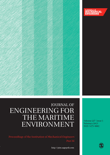
Proceedings of the Institution of Mechanical Engineers Part M-Journal of Engineering for the Maritime Environment
Elevating Engineering Standards for the Maritime EnvironmentProceedings of the Institution of Mechanical Engineers Part M - Journal of Engineering for the Maritime Environment, published by SAGE Publications Ltd, is a leading scholarly journal that addresses critical advancements in the field of maritime engineering. With an ISSN of 1475-0902 and an E-ISSN of 2041-3084, this journal serves as an essential platform for researchers and practitioners alike, disseminating original research, reviews, and case studies relevant to mechanical and ocean engineering. Recognized for its rigorous peer-review process, it currently holds a commendable Q2 ranking in both Mechanical Engineering and Ocean Engineering. The journal's reputation is bolstered by its strategic emphasis on innovative practices and sustainability in maritime environments. By providing a valuable resource for interdisciplinary collaboration, the journal facilitates the intersection of technology and engineering solutions critical for the evolving challenges within the maritime sector. Researchers, professionals, and students alike will find this journal instrumental in keeping abreast of the latest developments, best practices, and future directions in maritime engineering.
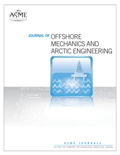
JOURNAL OF OFFSHORE MECHANICS AND ARCTIC ENGINEERING-TRANSACTIONS OF THE ASME
Unveiling breakthroughs in oceanic and mechanical challenges.JOURNAL OF OFFSHORE MECHANICS AND ARCTIC ENGINEERING-TRANSACTIONS OF THE ASME (ISSN: 0892-7219; E-ISSN: 1528-896X) is a premier publication by the American Society of Mechanical Engineers (ASME), dedicated to advancing the field of offshore mechanics and Arctic engineering. Established in 1987 and running through 2025, this journal provides a crucial platform for researchers and practitioners to disseminate their findings in a rapidly evolving sector faced with unique challenges related to energy, ocean engineering, and mechanical engineering. With a notable impact reflected in its Scopus ranks—#224 in Mechanical Engineering and #39 in Ocean Engineering—the journal holds a significant position in the academic community, publishing high-quality peer-reviewed articles that span innovative technologies, safety, and environmental considerations in offshore and Arctic contexts. While currently not adopting an Open Access model, its strategic focus and rigorous standards make it an essential resource for students, professionals, and researchers passionate about expanding knowledge in these critical engineering domains.
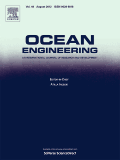
Ocean Engineering
Shaping the Future of Coastal and Marine SolutionsOcean Engineering, published by PERGAMON-ELSEVIER SCIENCE LTD, is a prestigious peer-reviewed journal that has been at the forefront of marine sciences since its inception in 1968. With an impressive impact factor and recognition in the Q1 quartile of both Environmental Engineering and Ocean Engineering, it stands as a key resource for researchers, professionals, and students alike. This journal focuses on a wide range of topics relevant to the field, including coastal engineering, marine resource management, and ocean dynamics, aiming to bridge theoretical research and practical applications. As ranked 14th in Ocean Engineering according to Scopus, it reflects the influential contributions of its articles and provides a platform for innovative discoveries that advance the field. Although not open-access, it offers diverse subscription options for accessing cutting-edge research. The journal’s ongoing legacy of publishing high-quality research continues to contribute significantly to the advancement of knowledge in ocean-related engineering disciplines.
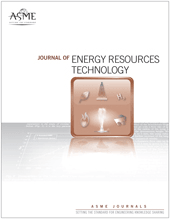
JOURNAL OF ENERGY RESOURCES TECHNOLOGY-TRANSACTIONS OF THE ASME
Transforming energy knowledge into actionable solutions.JOURNAL OF ENERGY RESOURCES TECHNOLOGY-TRANSACTIONS OF THE ASME is a prestigious journal dedicated to advancing the knowledge and application of energy resources technology across various disciplines. Published by the American Society of Mechanical Engineers (ASME), this journal plays a critical role in fostering innovative research within energy engineering, fuel technology, geochemistry, and mechanical engineering, evidenced by its solid impact factor and commendable Scopus rankings, including a Q1 ranking in Mechanical Engineering. The journal's comprehensive scope covers a wide array of subjects, from renewable energy solutions to sustainability practices, making it an essential platform for researchers, professionals, and students eager to contribute to and stay abreast of developments in the energy sector. With an impressive convergence history dating back to 1979, it continues to uphold rigorous academic standards and provides valuable insights into the latest technological advancements and methodologies relevant to the field. While the journal does not offer open access options, it is unequivocally a vital resource for those engaged in cutting-edge energy research.
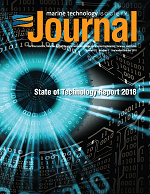
MARINE TECHNOLOGY SOCIETY JOURNAL
Charting New Waters in Marine Technology ResearchMARINE TECHNOLOGY SOCIETY JOURNAL, published by the Marine Technology Society, Inc., serves as a critical forum for advancing the field of marine engineering and oceanography. With a rich history dating back to its inception in 1969 and continuing through various converged years until 2024, this journal is recognized for its contributions to the understanding of marine technologies and their applications. It currently holds a notable Q3 ranking in both Ocean Engineering and Oceanography, as per the 2023 metrics, underscoring its significance in these domains. Although access is not open, the journal rigorously assesses and publishes high-quality research articles, technical notes, and reviews that engage a wide readership of researchers, industry professionals, and students alike. With the journal's aim to disseminate innovative findings and foster dialogue within the marine community, it promises to be an essential resource for anyone looking to explore the dynamic field of marine technology.